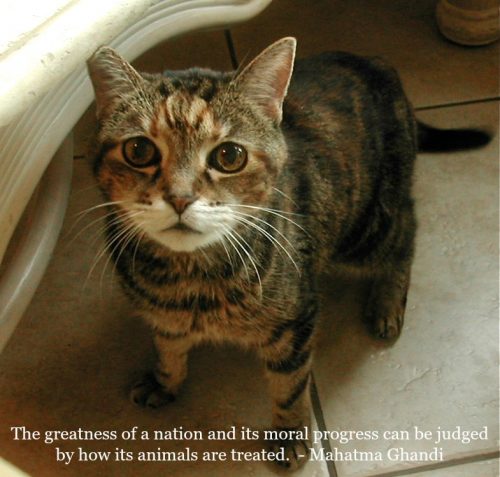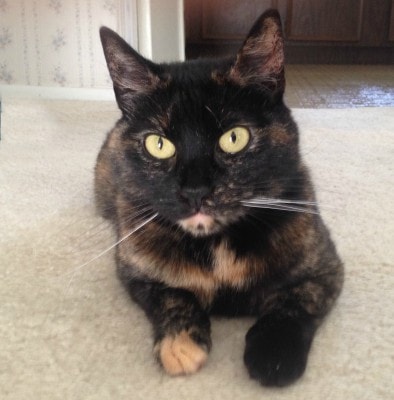
Conscious choices make a difference. Despite arguments that animal testing is a necessary part of medical research, and that finding a cure for human diseases outweighs the suffering this research causes to innocent animals, scientists are increasingly seeing that the results of animal experiments are not directly applicable to humans.
I won’t give to charities that support animal testing, and always check before making any type of donation. You may need to do a little research and possibly call the organization, but to me, it’s important enough to make that extra effort.
Photo of Kayla by Jodi Ziskin





If trying to find cures for humans the tests should be run on humans.
Feel the same as the others have commented. DISLIKE ANY ANIMAL TESTING. IN PARTICULAR TO CATS/KITTENS!
With all tech out there, why does research need to torture animals? Just because the animals are tested/tortured, does not mean that the results are good for humans.
I too, will not buy products or give to, if animals are tested/tortured!
This is a very volatile topic for me!
Very good point. I generally donate to causes close to home or those I personally know. Very kind of Safe Pet Haven to provide those links too! Sunday purrs from Deb and the Zee/Zoey gang!
Besides shopping for cruelty free products, it’s important to look for pet food that is cruelty free. The big companies like IAMS do hideous experiments on animals as research for their pet food.
Whether IAMS tests on animals (other than nutritional studies) or not is a controversial topic, but it is a fact that IAMS is owned by Procter & Gamble, and according to the UK based website Uncaged, P&G has allegedly admitted that they do use animals in their “product safety research.” I think it’s important to look for cruelty-free choices in everything we buy – that’s what conscious living is all about.
I really don’t have the money to do much donating, but when I do, I always support a local animal rescue.
I’m very conscious about the companies I buy from for all of my makeup, skincare and other items when it comes to making sure that they are cruelty free. It can get tricky because sometimes a certain brand is cruelty free but their parent company is not. I have a pretty tight budget so my donations pretty much only go towards rescues and no kill shelters. I wouldn’t have thought to check to see if a charity is cruelty free which now that you’ve mentioned it it seems like the 1st thing to do. It’s so easy to think charity =good and sadly that isn’t the case. This is valuable information for my future and to spread the word now. Thank you!
I agree wholeheartedly about checking out “charities” PRIOR TO to donating, for all kinds of reasons, and especially for humane-ness toward animals. This is especially important, unless you know board members personally, or have worked with/for them privately and can attest to their honesty and transparency.
I’ve found that CharityNavigator is very helpful in revealing important info, not necessarily the details regarding animal testing, but a good indicator of how they spend YOUR hard-earned monies they collect via your donations, and a good place to start for a long list of non-profits & charities, especially the more well-known ones.
Remember that all charities, huge or tiny, are not necessarily listed on these websites, and there are many very small, very honorable non-profits/charities that seriously need our support that are overshadowed by the large groups that have exponentially larger advertising budgets and payrolls – again, all paid by gov’t grants [our tax dollars] and donations — from corporate write-off to our personal individual donations.
Personally, I’ve changed my donations expressions and manifestations over the decades, based upon personal experiences — some good, and some horrrendously eye-opening. I now tend to donate locally, or in geographical areas where I have friends living there that can keep an eye/ear/nose out there locally in that community that can report back to me if anything seems amiss. Otherwise I tend to donate only after researching the entity personally, do interviews of both staff and volunteers, and if possible by first doing volunteer work myself to those that my heart most leads me to; then and only then will I consider giving them any form of cash. Mostly I give THINGS [“in-kind” merchandise] the groups say the need such as non-toxic cleaning supplies or pet beds, towels, etc. Things that are truly needed, but cannot be quite so easily abused as cash, especially where there is little financial transparency. Yes, even in the animal rescue groups.
There are other organizations that gather and report non-profit statistics, but here are a few of the easiest to find websites:
http://www.charitynavigator.org/
http://www.guidestar.org/
http://www.cof.org/content/foundation-basics
https://www.consumer.ftc.gov/articles/0074-giving-charity
http://grantspace.org/tools/knowledge-base/Nonprofit-Management/Accountability/locating-nonprofit-information
http://www.givewell.org › About GiveWell › GiveWell FAQ
Thank you for all these resources!